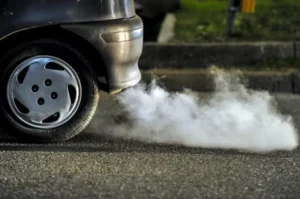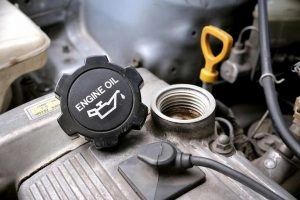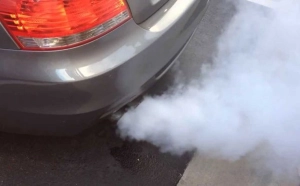Many car owners face the problem of white smoke emission from the exhaust pipe, which is a common issue in many Arab regions.
This issue is extremely troublesome and indicates that there is a problem with the engine. In this article, we will discuss the causes of white smoke emission from the exhaust and how to deal with this issue.

The main reasons for white smoke emission from the exhaust.
White smoke coming from the exhaust could be due to several reasons, such as:
Water leakage into the engine
When a water leak occurs into the engine, this water can penetrate into the internal parts of the engine, and it gets burned during the internal combustion process of the fuel within the cylinders. As a result, white smoke is emitted from the exhaust.
Water leakage into the engine can occur for several reasons, including:
1- Coolant system leak: The cooling system is used in the engine to maintain engine temperature and operate it efficiently. However, if there is a leak in this system, water may be able to enter the internal parts of the engine.
2- Leak in the engine head gasket: The head gasket is the upper part of the engine that contains the cylinder valves and other internal parts. If there is a leak in this part, water may be able to enter the cylinders.
3- Leakage in the internal radiator: The internal radiator is a space that contains water inside the engine head gasket. If there is a leak in this part, water might be able to enter the cylinders.
When water enters the cylinders, it will burn during the internal combustion process of the fuel, resulting in white smoke coming out of the exhaust. It's important to address this issue quickly, as water leakage into the engine can cause engine damage and costly repair.
Incomplete fuel combustion
Incomplete fuel combustion is a process where fuel burns, resulting in unpleasant odors and excessive amounts of white smoke from the exhaust. This combustion occurs when there is an imbalance between the ratio of fuel to the burned air.
When the engine is supplied with an excess amount of fuel, the necessary burnt air needed for complete fuel combustion is insufficient, and white smoke is emitted from the exhaust. This process is inefficient in terms of fuel usage and environmental pollution.
Several reasons could cause incomplete fuel combustion, including:
1- Fuel Injector Damage: It's usedFuel InjectorFor precise fuel injection into the cylinders, if the fuel injector is damaged or blocked, this could lead to excessive fuel spraying into the cylinders, causing incomplete combustion.
Also read:Black Smoke Emission from Car Exhaust: Top 4 Causes and Suggested Solutions

2- Air Filter Damage: The air filter is used to purify the air entering the engine. If this filter is dirty or blocked, it may reduce the amount of combusted air flowing to the cylinders, leading to incomplete combustion.
3- Spark Plug Damage: The spark plugs serve to ignite the fuel inside the cylinders. If the spark plugs are malfunctioning or damaged, they may not ignite the sufficient amount of fuel within the cylinders. This results in an incomplete combustion, and the expulsion of white smoke from the exhaust.
Oil Contamination
Oil contamination is a common problem that can cause white smoke emission from the exhaust. Oil is used in the engine to lubricate the moving parts and maintain the smooth running of the engine. However, the oil can become contaminated due to the natural wear and tear of the engine or due to the lack of regular oil changes.
When the oil is contaminated with foreign substances such as sand, dirt, or solid debris, it can damage the moving parts of the engine, and can cause the emission of white smoke. The moving parts can also be damaged if the oil is not changed regularly, resulting in a build-up of foreign substances in the oil.
If the oil is contaminated, it should be changed immediately, and changing the oil filter can also help reduce pollution in the future. Owners should also regularly change the oil according to the schedule recommended in the car owner's manual.

Excessive heat
The cooling system in the engine relies on the flow of coolant and air around it to disperse the heat generated by the combustion process inside the cylinders. If there is a fault in the cooling system, such as coolant leakage, a blockage in the external radiator, or a malfunction in the cooling fan, the engine temperature may significantly increase.
When the engine temperature rises, the cooling water turns into steam, and the coolant may leak through weak hoses and clamps, causing white smoke to emit from the exhaust. Additionally, a rise in the engine temperature can damage engine parts, thus affecting its performance and increasing the likelihood of emitting white smoke.
Therefore, it's important to maintainCooling SystemKeep the engine in good condition by regularly inspecting it, changing the fluids and filters regularly. Also, make sure there are no leaks in the cooling system and replace any damaged parts. Also, pay attention to any warnings or signs on the dashboard that indicate an increase in engine temperature and deal with them quickly and efficiently.

Comments